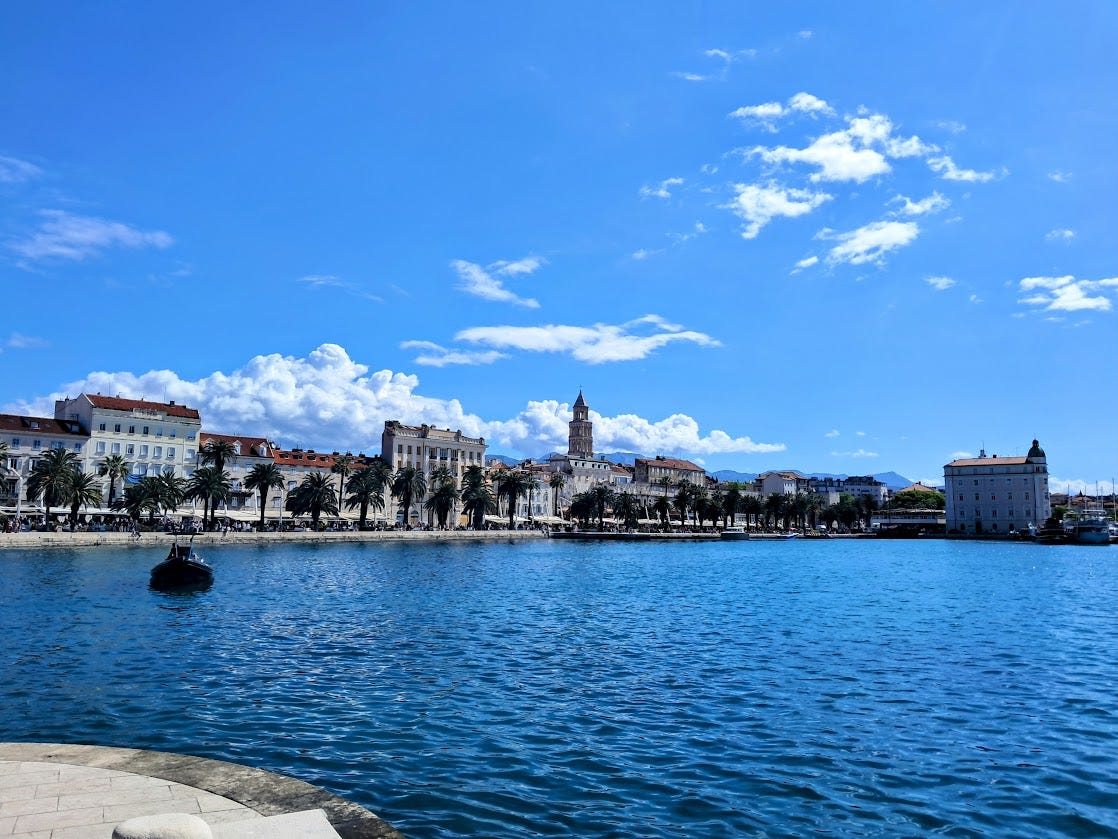A conversation in Split, Croatia this past April:
Barista, “Hi. How can I help you?”
Me, pausing for a moment while I organize my words, “Bok. Kavu, molim.” [Holds up two fingers to indicate two coffees.]
The barista smiles, then asks, “To go?”
Me, “Da, molim.”
The barista smiles again, then tells me, “Two euros.”
I hand him the money and say, “Hvala.”
The barista’s smile gets bigger.
A moment later, two coffees are served. I take them and say again, “Hvala.”
The barista smiles and says, “Thank you. [pause] And thank you for speaking a little of my language. Most visitors here do not try.”
*****
I am not a linguist, nor is my husband. We both know smatterings of other languages but are not fluent in anything except English. We know that we can just glide through most places we visit and rely on those we interact with to speak our language. Goodness knows we’ve seen plenty of other English speakers doing that.
True story: When we were in South Africa in 2015, we met a group of Englishmen during breakfast at our lodge near Kruger National Park. We started talking to them and learned that they had retired and moved to Portugal, where they happily played golf, soaked up the sun, and lived well.
We asked the men about learning Portuguese and their response was (not entirely paraphrased here), “Nah, it’s too hard. Besides, everyone there speaks English.” We have since learned from firsthand experience that, no, not all Portuguese people speak English. That conversation has stuck with my husband and me ever since.
Since we don’t want to be those English speakers who assume all of the world speaks our language when we travel, we make sure we know at least five essential words for the country we’ll be in:
hi
yes
no
please
thank you
Add to this a pleasant demeanor, good manners, and respect for our host country, and we hope that others will offer us some grace for not being fluent in their language.
As our trips progress, we usually pick up more and more words, including:
goodbye
excuse me
I’m sorry.
Do you speak English?
I don’t understand.
After we left Split, we popped into neighboring Bosnia-Herzegovina to hike for a few hours, then came back into Croatia. As we neared the border, I quickly looked up the five essential words we always try to know. As it turned out, the two languages are quite similar.
I am not judging other travelers. I promise I’m not. Travel can be stressful and there’s a lot that our brains are taking in and processing. Add in jet lag and things get complicated. I can’t tell you how many times I’ve stepped up to a cash register in another country and all the words I need to know have melted out of my brain instantly. It’s humbling and I am in awe of anyone who speaks two or more languages.
For this most recent trip, we started and ended our travels in Portugal this past, with our final week spent in one particular town that we like very, very much. I’ve been studying Portuguese off and on for a couple of years, usually ramping up my lessons as a visit approaches. My language skills remain woefully basic, especially since I’m not immersed in Portuguese daily.
One morning at the end of our recent trip, I needed to take care of some errands and was determined to speak only Portuguese. As I walked, I reviewed some relevant words and phrases. I entered a shop and greeted the owner, an older Portuguese woman. I told her in very basic Portuguese what I was looking for. She responded in slow, careful Portuguese and our conversation went from there.
When I didn’t know a word, I used hand gestures to indicate what I meant and the woman would supply the word I needed. I would repeat it to show I understood and we’d continue. When I got something wrong, the woman kindly and gently corrected me, which I would repeat to show my understanding.
At the end of the transaction, I left the store with not a single word of English spoken by either of us. I was — and still am — so proud of myself. I was able to replicate that success another time that same day.
My husband and I are planning a trip this fall to a country we’ve never visited. I’ve started learning bits and pieces of the language now, knowing I won’t be fluent but still hoping to learn more than just the usual 5-10 basic phrases.
Tell me about your language skills. What languages do you speak? Do you try to learn other words and phrases when you travel?




What you describe is cultural humility where we acknowledge that we are guests in someone else’s country. They don’t have to accommodate us, we make the effort, like you did to speak basic phrases to show we respect them. Kudos on your exchange with the shop owner. It feels good, right?
The time doing eye exams on a medical mission trip in Honduras. Like you, I had practices a few phrases I knew I would use during the exam and giving instructions. The person has complained of itchy eyes, I want to give her some of the allergy eye drops that wee donated. I explan to the patient "usa dos gatos", before I can finish my practices phrase, I see my 13 year old translater laughing. "you just told the patient to put 2 cats in her eyes"! Gato= cat, Gotas= drops.